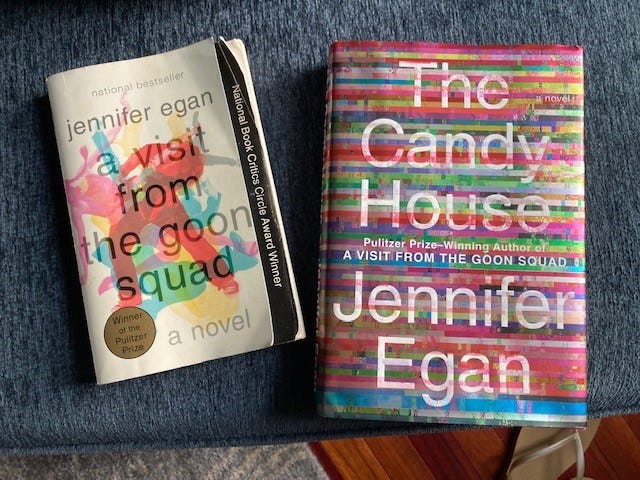Read[H]er: "The Candy House" & "A Visit from the Goon Squad" by Jennifer Egan
Two linked novels that explore damn near every aspect of life before and after the Internet ate everything.
I practically marked the publication date on the calendar when I heard that Jennifer Egan was releasing a companion novel (or, as Egan has called it, a “sibling novel”) to A Visit from the Goon Squad, her 2010 Pulitzer Prize-winning novel that knocked my socks off when I first read it. Goon Squad follows the lives of various teenage friends and bandmates as time ravages (and, occasionally, rewards) their youthful dreams of music stardom. The novel turns itself inside out and around, gyrating around its subjects—not only does it follow the once-teenagers themselves through decades of their lives, it leaps into the lives of others only tenuously connected to the core group. The novel’s inventiveness crackles: one especially memorable chapter is written entirely through PowerPoint slides; another as a longform exposé. The novel’s predominant concern is the world of music, and music permeates the novel in all of its aspects, from its lively prose to its structure that most resembles that of an album, with its tracks and grooves, its ability to be lifted off the turn table and turned over for the B side. Goon Squad ends just as the world of the internet begins; the novel’s last chapter references a rudimentary form of social media and its attendant influencers, but 2010 was a time before smart phones and social media enjoyed the total ubiquity they do today.
The Candy House picks up where Goon Squad left off, both in its resuscitation of characters and in its treatment of the internet as its main, now totally inescapable, subject. We are reunited with some of the characters from Goon Squad and introduced to a whole constellation of new characters as all of them grapple with the ways in which a new form of technology infiltrates their lives and very consciousness. We begin the novel with Bix Bouton (a peripheral figure from Goon Squad), a tech god who has unleashed next-level social media on the world: Own Your Unconscious, a cube into which you can download your life’s worth of memories and then opt to keep private for posterity or to share with the Collective Consciousness of the world. The Collective is a large, pulsing stream of memories that members can access and thereby find and “see” the memories of anyone who has shared them. So, want to know what your ex-boyfriend was thinking when he broke up with you? Or what your ancestors were thinking during pivotal (or mundane) moments of their lives? Tap into the Collective Unconscious.
The internet is the world of The Candy House, in both content and form. Like its predecessor, Candy House leaps from character to character: just as you get to know Bix in the moment he conceives of this all-encompassing extension of social media, the story jumps to an entirely different character (Alfred Hollander) whose connection to Bix is so tenuous as to be hard to find (he is the youngest son of one of the professors who inadvertently influenced Bix’s creation). If the heart of Goon Squad is music, the heart of Candy House is the internet itself: the structure of the novel feels like the internet, where clicking on one link and then another and then another can take you far away from the story you started with, so far you might forget where you began. This novel not only meditates on the internet and social media, it mimics it in its very form.
Egan has talent to spare, and an endless supply of ideas and characters to populate many fictional universes. But sometimes Egan’s strengths are the novel’s weaknesses: Egan creates so many compelling characters that I sometimes wished she would sacrifice breadth for depth. At one point, when Egan dispatched of one character’s gripping storyline in a few sentences, I found myself wishing she’d take those few sentences and expand them into a whole chapter, or an entire book. So if Egan is guilty of anything, she is guilty of having too many ideas, too many characters, of too successfully embodying in novel form the internet itself. So maybe you’ll need to read a big fat 19th Century novel afterwards to reset yourself as a reader; in the meantime, The Candy House offers allurements both simple and complex in its ever-expanding, voracious world.



